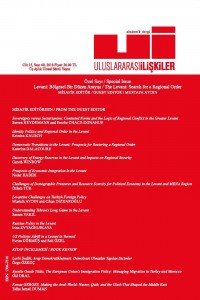Egemenlik Mezhepçiliğe Karşı: Geniş Levant Bölgesinde Çatışan Normlar ve Bölgesel Çatışmanın Mantığı
Abstract
Orta Doğu, uzun süredir bir karmaşa ve şiddetli çatışma dönemiyle karşılaşma devam etmektedir. Artan çatışma ve rekabet seviyesini anlamada için iki temel yaklaşıma başvurulmaktadır: İlk yaklaşım açıklamasını, mevcut sorunları doğuda kalan Arap coğrafyasında şiddetlenen mezhepçi kutuplaşmaya dayandırmaktadır. Bu yaklaşıma göre bölgesel dinamikler en iyi şekilde, mezhepçi rejimlerin de aracı olarak kullandıkları kimlik politikalarıyla açıklanabilir. İkinci yaklaşım ise sorunların kaynağını devletin zayıflığına dayandırmaktadır. Bu yaklaşıma bu coğrafyadaki devletlerin kırılgan yapısı, etkili kurumların bulunmaması ve meşruiyet açığı sorunu elitlerinin devleti sosyal bölünmeyi artıran yöntemlerle yönetmelerine imkân tanımaktadır. Bu makale, her iki argümanın da Geniş Levant bölgesi ve doğudaki Arap coğrafyasında yaşanan bölgesel çatışmaların şeklini ve eğilimleri açıklamada yetersiz kaldığını savunmaktadır. Mevcut bölgesel dinamiklerin, bölgesel güvenlik düzeninin egemenlik normuyla mı yoksa mezhepçilik normuyla mı idare edileceği bağlamında ortaya çıkan rekabet ile en iyi şekilde açıklanacağı değerlendirilmektedir. Bu mücadele hiçbir normun egemen olmadığı normatif bir bölünme ortamında devam etmektedir. Bu durum, çoğunlukla farklı dini inanışlara sahip toplumları içinde barındıran ve yüksek seviyede sınır- ötesi müdahalelere sebep olan devletlerde ortaya çıkan şiddetli çatışmalarla gözler önüne serilmektedir.
References
- ......
Sovereignty versus Sectarianism: Contested Norms and the Logic of Regional Conflict in the Greater Levant
Abstract
The Middle East is experiencing an extended period of turmoil and violent conflict. Two main explanations exist to account for heightened levels of conflict and competition. The first attributes current conditions to the intensification of sectarian polarization in the Arab east; regional dynamics are best explained by identity politics, which serve as instruments of sectarian regimes. The second attributes current conditions to state weakness; states in the Arab east are fragile, lacking effective institutions and suffering from a deficit of legitimacy, allowing state elites to govern in ways that exacerbate social cleavages. We view both these arguments as insufficient to explain patterns and trends in regional conflict across the greater Levant and the Arab east. Instead, we argue that current regional dynamics are best explained in terms of competition to determine whether a regional security order will be governed by the norm of sovereignty or the norm of sectarianism. This struggle plays out in an environment of normative fragmentation, where neither norm is hegemonic. It is unfolding most directly through violent confrontations within states that contain multi-confessional societies and exhibit high levels of cross-border intervention.
References
- ......
Details
| Primary Language | English |
|---|---|
| Journal Section | Articles |
| Authors | |
| Publication Date | December 1, 2018 |
| Published in Issue | Year 2018 Special Issue: The Levant: Search for a Regional Order |


